KICK OUT THE PROFITEERS… FOR A SOCIALIST ALTERNATIVE!
Wole Olubanji (Engels)
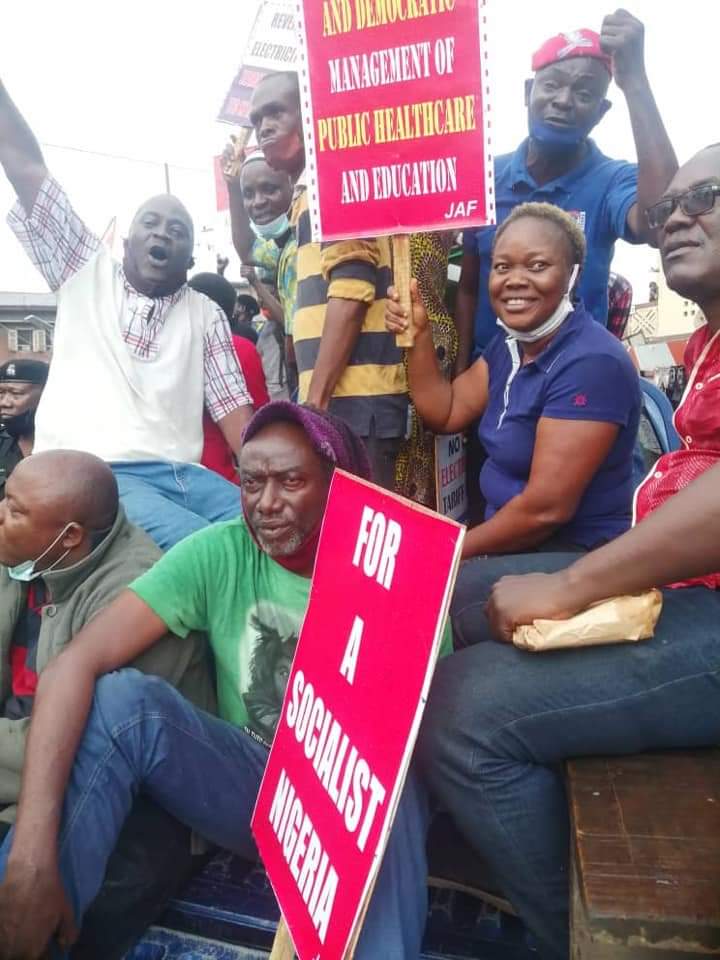
President Buhari has unleashed blows after blows on the working masses of this country as a means of saving the profits and luxurious lifestyles of the country’s capitalist elites in the face of a recession the Covid-19 pandemic has worsened. While the working people express hope, and now bewilderment, about the regime’s abandonment of the people to deepening poverty, different state interventions in big businesses have led billionaires smiling to banks. This is a consequence also of the regime’s submission to the will and dictates of Imperialism as represented by the IMF and World Bank.
The bookmakers of the regime are gambling on a false hope that the leadership of the traditional organizations of the working class, of the trade unions, will acquiesce to the regime’s logic and hold the working masses from revolting against this barrage of attacks on living standards of the working class. Where this was proven unachievable, it would employ the coercive force of the state apparatuses, like the police and the military, to forcefully remove any opposition to its programs of poverty and hardship. This is already being exhibited in the attacks on peaceful protests of the members of IPOB and protesters in Northern Nigeria, considered to be the base of President Buhari. Such heavy force has equally been employed against every pocket of protest organized by the SPN, JAF, and RevolutionNow protesters, in Lagos.
But where the regime barks to show its strength, the working class must roar to express its superior moral and numerical strength over the powers that have declared itself foes of the people. It must infuse courage in its leadership and compel it to take the center-stage of history and lead the working masses into a struggle not only against the regime but against capitalism. The Buhari regime has exhausted all of its goodwill with the masses and has demonstrated that it is no different from previous regimes.
The so-called slogan of “change” has now been exposed to be fake, given the regime’s continuous embrace of capitalism. The regime has arrived at the same dead-end as previous capitalist regimes before it. It has now resorted to the same lies, policies of privatization, and deregulation that while in opposition it opposed. Its failures and deception have left the working-masses with no other option than to set the agenda to organize and take-over power and constitute a Workers’ and Poor People’s Government that will plan and managed the economy to meet the needs of the people as opposed to the current and pervading practice of satisfying the greed of the few elites for billions at the price of condemning the masses to a life of penury and poverty.
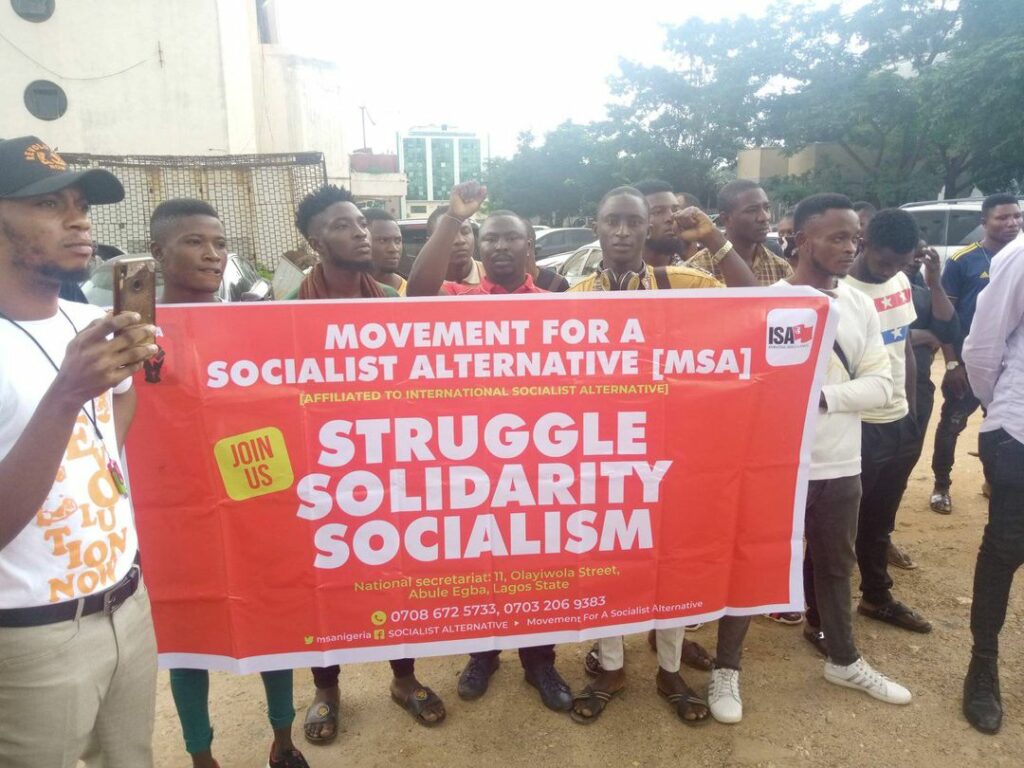
THE BARRAGE OF ATTACKS
Within 72 hours of the beginning of September, the poor and working people were barraged by an increase in the prices of electricity and petrol. Both are the major sources of energy for average Nigerians to power their houses and businesses. Any increase in either will ordinarily touch off the prices of market commodities; an increase in both has already led market prices to unaffordable proportions for the average person. Before the latest attacks, the government had increased Value Added Taxes (VAT) and Stamp Duties.
The Buhari’s regime operates on a false logic of canvassing the infliction of hardship and attacks on the people as policies aimed at alleviating hardship borne by Nigeria’s working-masses. While selling off the increase in VAT to Nigerians, the regime canvassed it as a design to increase the revenues of state and local governments. Meanwhile, the state and local governments have remained the same in their management of poverty while maintaining the regime of siphoning funds through an elaborate patronage system in their respective areas of jurisdiction. The same logic was applied to the recent increases in electricity and petrol prices with propaganda portraying the increased hardship on the people as the lifeline required by Nigeria’s economy to survive the Covid-19 pandemic. But this however is not new; the same falsehood has been employed by regimes before this one, both military, and civilian. The outcome has been the same, with the economy becoming worse for the working masses.
Facts are stubborn by their nature, says a Russian proverb. The stubborn facts were reflected by the National Bureau of Statistics (NBS) when it published a damning outlook of Nigeria’s Human Development Indices. Presenting its assessment of the unemployment situation in the country, the NBS reported that 21.7 million Nigerians remain unemployed. (Nairametrics, 14th August 2020). Analysis of the NBS figures further shows that only 3 out of 10 young persons are fully employed; the remaining 7 persons are either completely unemployed or unable to differentiate their status from unemployed people. Bear in mind that the NBS is not an independent body, which explains why the indictment of the regime by its agency cannot be ignored. It shows many truths for the common people, beyond the lies peddled by the regime’s praise singers. One, this is the worst time to be a young person in Nigeria. Two, Covid-19 is not responsible for the inability of the Buhari regime to improve the living standard of Nigerians or industrialize the country’s economy, because the present unemployment figures are those consolidated since 2017 when the NBS last published data on Nigeria’s unemployment outlook.
NIGERIA NOT WORKING FOR THE WORKING PEOPLE AND POOR BEFORE THE PANDEMIC
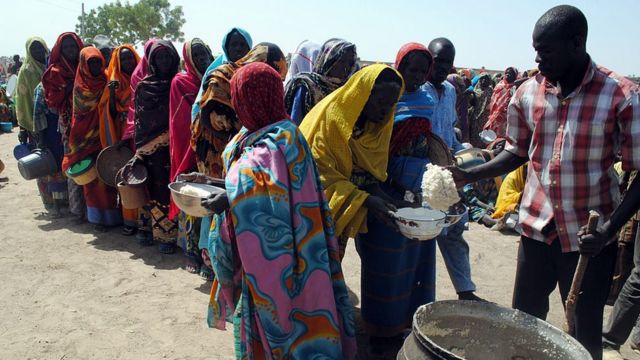
The regime has labored to provide excuses for the recent increments in the prices of petrol and electricity. One of the excuses, for the increase in petrol prices especially, is that the previous prices were sustained by a corrupt oil subsidy regime. The government’s agents go on to argue that stopping the payments of oil subsidy, costing the country billions in naira, is important at a time the country is cash strapped from the Covid-19 downturns because the funds saved from this will be invested in infrastructures and other social projects.
The much talked-off corrupt oil subsidy regime was organized and perpetrated under the nose of the Buhari regime. Before 2015, when the APC politicians were in the government’s opposition, the poor people might be carried away by the talk of a conspiracy between the government and the oil marketers to defraud Nigeria of monies disbursed for oil subsidy. But with Buhari returned to power for a second term in office, any talk of a corrupt oil subsidy regime is an indictment of the regime by the regime. The NNPC in charge of this payment is under the direct supervision of the President who is the Minister of Petroleum for the second term. There is no doubt about it that there is an established corruption in the administration of subsidy, but it is a corruption that must necessarily involve the President down to the lowest hierarchy of power distribution in his cabinet. Speaking of corruption and the Buhari regime, the recent drama around the investigation of the Niger Delta Development Commission (NDDC), the accusations and counter-accusations of fraud, are as recent a marker one can point at to show how entrenched corruption and diversion of public funds are in the Buhari’s government.
In reality, the regime of oil subsidy in an OPEC country like Nigeria is an abnormality. Nigeria is subsidizing fuel because the successive governments, Buhari’s government inclusive, have repeatedly failed to facilitate the country to refine its vast deposit of crude oil for domestic consumption at least.
Instead, promises to resuscitate Nigeria’s four refineries to meet local demands have become licenses of embezzlement for government officials and contractors. With more than N2.3 trillion spent on rehabilitating the refineries between 1993 and 2016, the project has become the proverbial attempt to fetch water with a basket. (ngrguardiannews September 22, 2019) The so-called market economy, aka. Capitalist Democracy, repeatedly stole the money meant for the expansion of Nigeria’s refineries, so that the country could meet its local demand for fuel without the cutthroat prices associated with the importation of the refined product. This act is an indication of the failure of capitalism to develop this country’s industry before a pandemic.
While the regime was hatching the plan of removing the fuel subsidy, the Punch newspaper of May 10, 2020, reported that the refineries refined no petrol or other products in eight months. Any attempt by the regime to grandstand as a champion of the people must be rejected. The working class must now begin to seek solutions to the problems facing Nigeria within their class, by taking over the oil sector, which has become a source of illicit wealth for a few, privileged cronies and fronts for political officeholders. At a time the government is complaining of being cash strapped, it is only the people that can conduct a much-needed investigation into the trillions of naira that have been wasted in the name of Turn Around Maintenance (TAM) on the refineries that are central to resolving the problem of fuel scarcity. We agree with the government that these are critical times, but they demand radical approaches that only the people can be trusted to carry out.
BUHARI BELONGS TO THE SUPER-RICH
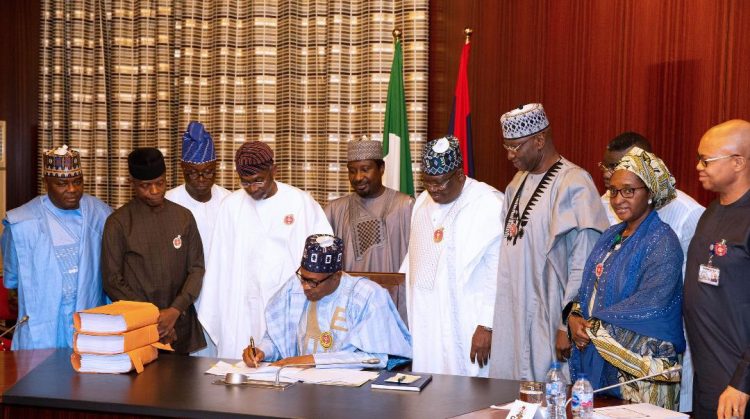
A couple of policies announced by the Buhari’s regime in the first week of September clarifies whatever doubt about what and who the President represents. At the inception of his administration on May 29, 2015, Buhari had laid claim to populist centrism, saying he belonged to nobody and everybody. But drawn tightly between the masses of the working people in need of concrete social support during the worst humanitarian crisis in a hundred years and the billionaires afraid of losing some of their vaulted billions, President Buhari confirmed his allegiance to the billionaires.
The power sector provides a veritable example. The DISCOs in 2019 was fingered by the government’s regulatory agency as inept, grossly incapable of distributing the limited energy generated by the Generating Companies (GENCOs). Both the TCN and the NERC, owned by the government to provide some regulations and control over the privately controlled DISCOs and GENCOs, clearly stated that the owners of DISCOs lacked the requisite capital to take up the strategic function it had greedily arrogated to itself. It is now urgent to renationalize the entire power sector than allow the greed of the billionaires to hold the nation to ransom. The workers in the power sector must oversee such renationalization and place the sector under their democratic control to prevent the ministers from turning the sector into a cash-cow.
While the DISCOs were distributing darkness across the length and breadth of Nigeria, they were also conducting an extensive fraud against the poor. Neighborhoods populated by working people, artisans, or the poor were and are still left unmetered; this left the calculation of power bills to the estimation of the DISCOs. The class basis of the Nigerian society quickly made itself felt in power billings as the well-to-do could easily walk their way around procuring meters; the few working-class neighborhoods that got metered paid their way through the process, against every law that demanded free allocation of meters. The oppression of the poor and working people in this area of metering and electricity distribution also meant that the metered areas were allocated more hours of electricity for them to exhaust their subscriptions than the unmetered houses billed at the mercy of DISCOs profiteers. But by an irony peculiar to capitalism alone, the unmetered houses with fewer hours of electricity pay more to get their houses and businesses powered.
It is against this oppressive and exploitative background that the Buhari regime sanctioned about 100% increments in electricity tariffs. To give an impression of consideration for the poor, the government announced that it has pleaded with DISCOs not to extend the increment to the poor. In reality, urged on by the regime, the DISCOs have been efficient in its total increment of electricity tariff while electricity supply has been reported across the country to be poorer than before.
FIGHTING BACK; A SOCIALIST REVOLUTION AND ALTERNATIVE
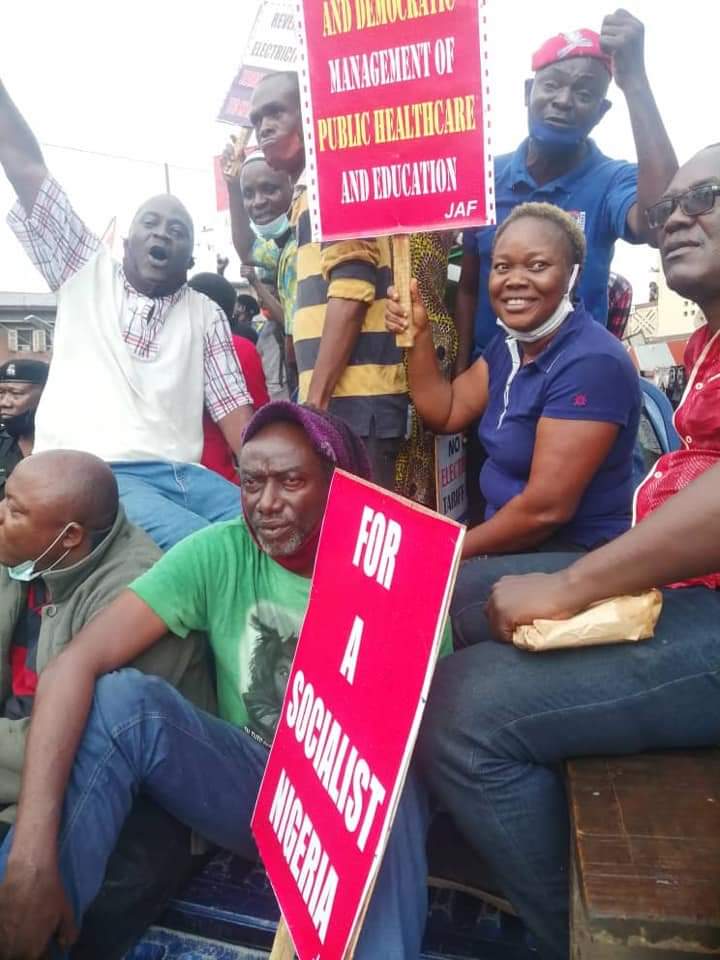
The conditions of the working people will not get better under the Buhari regime. The working people and poor must take a stand for radical change to their lot. Right now, the regime has indicated the readiness to introduce more taxes. But the people are not taking these attacks lying down. The working-class movement is presently characterized by pockets of notices of industrial disputes, warning strikes, or strikes. But these are limited to individual unions like ASUU, NARD, the unions of Nurses and Midwives, and the combined unions of the non-academic staff of universities. This is an indication of the storm to come. But the regime is pretending to be unfazed by these disparate actions just because of their disparateness and inability to concentrate forces of the oppressed, articulate general social demands, and lead the people in a struggle against the Buhari regime.
The leadership of the Nigeria Labour Congress (NLC) and Trade Union Congress (TUC) is missing and relished by the people. Peculiarly, young people are taking to social media with petitions that the people call the President of the NLC to declare a general strike against the myriads of attacks against the people. This is a recognition of the vital and qualitative role of the labor leadership in providing direction for the struggle of the oppressed people. Pressures must continue to be piled on the leadership of the organized labor to abandon its complacency and take to the barricades.
The regime has revealed its fear for the resistance of the population against its latest policies. The pockets of protests organized by socialist and civil society organizations, like the Socialist Party of Nigeria (SPN) and the Joint Action Front (JAF), were forcefully dispersed. These protests are not yet massive, but they are mobilizing the people and mounting pressure on the leadership of organized labor to provide leadership. The Central Working Committee (CWC) of the NLC and the leadership of the TUC have also issued a two weeks ultimatum to the regime to reverse the recent increases in the prices of petrol and electricity.
It is impossible at this time of the sustained attack on the working people for the labor leadership to avoid struggle because the attacks are yet to peak as they are going to reflect the tendency of the state-governments not to pay minimum wage, which will further hamper the purchasing power of working-class families.
This is a period of struggle, but they must be guided by the correct perspectives and demands that express the aspiration of the working and poor people of this country.
MILITARY TAKE OVER?
Some are putting on the agenda the question of a military takeover of power following the coup in Mali. Such a coup is not impossible, considering the fatigue and problems with the frontline soldiers battling the Boko Haram insurgency and conducting police work across the states hit by banditry. Soldiers are killing their senior officers or committing suicide to avoid the stress of the war. The Commanding Staff of the military has remained unchanged for five years, fueling agitation for its change in the country, which may have ricocheted into the military itself. All these factors, combined with the fact that the rank of the military is not insulated from the social crisis that is the lot of many homes, put the possibility of a military coup on the table.
But it is important to dispel any illusion in the emergence of a military dictatorship to put an end to the problems caused and perpetuated by capitalism. The working masses must however place no trust in any gang of Generals, and rank of the Armed Forces to end this crisis. If anything, the military brass is part of the regime and has benefited most from a defense budget occasioned by the war against Boko Haram, which in reality is only a conduit pipe for the military top brass to line their pockets.
A possibility of a more junior officer’s corps seizing power is equally not a bright option for the working class as history has proven such intervention at the end to be turned against the interest of the oppressed for liberty and economic development. The problems bedeviling Nigeria are only such that the working people at the head of the oppressed, even the rank and file of the military, can resolve, because of their direct involvement in economic production and capacity to implement the will of the people for social growth.
RESOLVING THE QUESTION OF BUILDING A GENUINE, WORKING-CLASS POLITICAL ALTERNATIVE

A major crisis that faces the working-class movement in Nigeria is the challenge of building a genuine working-class political alternative. This crisis becomes more deepened as the ruling class spreads the illusion that the working people have no choice at the end of the day than to vote for any of the bourgeois parties that are different in nothing but name. The ease of crossing from one bourgeois party to another is phenomenal and it indicates the understanding among the ruling class that they have no disagreement over programs, but about who shares the national cake at a particular time.
The Labour Party, formed by the top bureaucrats of the labor movement, has become a “second eleven” to the dominant capitalist political-parties in the country. It does not intervene in the day-to-day struggles of workers, students, and youth and serves alternatives for bourgeois elements, who lose out from the traditional battle for party tickets in the main pro-rich political parties. It does not orientate towards recruiting rank-and-file workers into its ranks or seek to deepen its roots in working-class communities. The vacuum of a mass working people’s political alternative is deep and putting the mass of the oppressed to maintain indifference during elections, as reflected during the 2019 general elections with its unprecedented low turn-out of voters since the return to civil rule in 1999.
However, the Socialist Party of Nigeria (SPN), formed by genuine socialists and rank-and-file trade unionists and workers, poses a clear alternative with its clear program of socialism for Nigeria at this transitional stage in its history. While at this stage a mass working people’s party has not emerged, the SPN provides a veritable platform for genuine socialists, including the forces of the MSA to campaign for such a broader party and spread the ideas of a genuine socialist alternative in working-class communities, while standing in elections.
Yet, the SPN must engage in regular interventions in the day-to-day struggle of the working people, while raising its banner to increase its profile in the arena of struggle. The party must also be ready to employ every advancement available to a 21st century Nigeria to promote socialism and reach the swathe of young people that have demonstrated their attraction for radical ideas in the new feminist movement and the #RevolutionNow movement about the country. This must be combined with aggressive party-building efforts in the communities. This can lay the basis of strengthening the campaign for a mass, working people’s alternative on a socialist program.
Presently, Nigeria’s political elites are thinking about survival and understand the danger a party like the SPN represents to the survival of its class. The national assembly had in 2007 clandestinely amended the constitution of the country to enable the country’s electoral commission, INEC, to deregister political parties on the criteria of electoral victory or the number of votes amassed in an election. In a country where vote-buying and mass apathy have fraught every election since 1999, the deregistration of parties is targeted at parties like the SPN that pose an ideological challenge and existential threat to the bourgeois parties about the country.
A federal court of Appeal has since declared unlawful the deregistration of the SPN, but INEC has ignored the ruling and is appealing at the Supreme Court. But it is clear that it is only a struggle of the people, educated to see the alternative the SPN represents, that can save the party, not a court ruling. The ruling at the Appeal Court was technical, which accepted the powers of INEC to deregister the party, but ruled that the criteria set out by the constitution were not met before the deregistration. The struggle of the party must challenge the basis of the undemocratic constitutional amendment that empowered INEC to restrain the rights of Nigerians to their choices of parties and ideas, especially at a time the capitalist content of the dominant ones is pronounced by the day to the detriment of the working people and poor.
The problems of unemployment, low wages, out of school children, infrastructural decay, and deindustrialization and poverty are created by capitalism and the contentment of Nigeria’s ruling class with the role of middlemen it plays in the global capitalist system. This role of a middle man is prevalent in Africa and other neo-colonial countries, where a few billionaires can emerge from extracting raw materials and selling them off to industrialized countries or simply providing services to their population. It inhibits the creation of value that can advance technology, education, or advancement in neo-colonial countries. But it is part of capitalism, it is profitable, but it brings general barbarism to the population bedeviled with it.
The task, however, before the working people of this country is to put an end to this system. The working people need to assert their leadership over society by taking over the means of production, with the will and democratic discipline to radically improve the productive forces and expand production. It is important to agree that the pandemic has several lessons for us; one of them is to not put our lives in the hands of profiteers.
